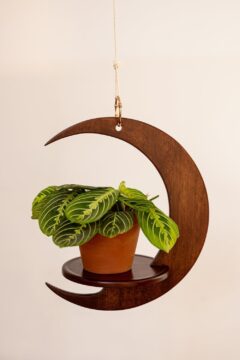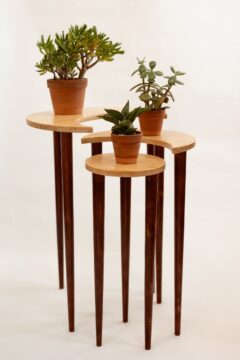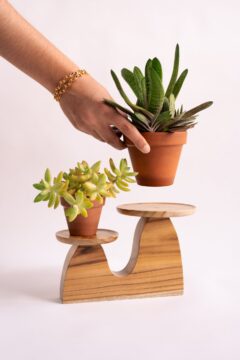It was the middle of the pandemic and Zainab Hussain had just moved into a new home with her husband Zaidali Rasool, with a lot of free time and dreams of beautifying the place.
As an ardent plant lover with a questionably large collection of flora, just leaving them strewn all over the place was never an option.
But when her hunt for suitable plant furniture — one that appealed to her aesthetic vision of retro-inspired — resulted in abject disappointment, she decided to take matters into her own hands.
Rhizhome is a plant furniture company that makes hangers and stands in beautifully hand-finished wood with looks inspired by vintage furniture design. The products are designed for the modern home, where space is at a premium and adaptability is key.
These were the reasons that led Hussain down this path. But it didn’t start off with the aim of becoming a business.

The sleek shape of the Moon Hanger is the ideal frame for medium sized plants and the dark stain contrasts perfectly with a bright window. Photo credit: Rhizhome
“I was looking for alternatives to what was out there, and I thought of just building my own,” says Hussain.
Fortunately her father-in-law had a wood workshop in Mumbai, India and was more than happy to make her whatever she wanted. Hussain and Rasool — both designers and artists by profession — quickly put pen to paper and had a few designs ready.
“The initial idea was to just make a few things that I think are nice for my own home,” says Hussain.
The more they went down the designing rabbit hole and talked with friends and family, the more they realized “maybe we’re not the only ones who want this.”
And thus, a business was born.
Hussain has always been involved in the plant community and felt it was the perfect time to get into it. A lot of people were stuck at home and interest in plants and beautifying homes was rising. The designs they were coming up with for Rhizhome were simply not available elsewhere.
“People were spending a lot of money on their plants,” says Hussain. “And if you are, do you really want to end up with basic wooden shelves?”
Bringing the entire product range to market was an arduous process. Once the designs were done, they needed to be tweaked based on limitations of the wood shop in India.
“We had to work with the types of wood that they had available,” says Hussain. “And we needed to make sure the products weren’t heavy as these craftsmen work on solid wood and not fibreboard.”
Having lived in a small apartment and small houses, Hussain wanted the products to have a small footprint so they could fit everywhere.
“That’s why we also have nesting tables, so you can push them all together at the end of the day and they don’t take up a lot of space and then you can take them out,” says Hussain.
Rhizhome’s aesthetics are inspired by “vintage, mid-century modern” looks that go with wood. “It needed to look vintage but not old-fashioned,” says Hussain.

The Moon Stand consists of three tables that can be styled together or on their own, and can be used exclusively for plants, or a coffee, book or candles. Photo credit: Rhizhome
Working with a workshop on the other side of the world brought its own challenges.
Hussain and Rasool shake their head and laugh as they recollect what is clearly not a highlight of the entire journey. They learned a lot about communication and quality checks in a very short of span of time.
“You can’t take anything for granted,” says Rasool.
While the craftsmen themselves were more than capable, a lot would get lost in translation. Hussain and Rasool rapidly adapted and switched their approach to being more pedantic in their communication, feedback and quality checks.
Eight months after the first designs were sketched in Ottawa in summer 2021, Rhizhome’s first shipment arrived from India, ready for sale.
But running a business is more than just manufacturing and design.
“A lot of burnout. Extreme amounts of burnout,” says Rasool. He and Hussain were still working day jobs and would do this in their free time.
Rasool believes social media falsely portrays entrepreneurship as “extremely glamorous” when it simply isn’t.
“It’s not a get rich quick scheme, but a very slow and arduous process,” he says. “It’s not meant for everyone.”
When the products finally arrived, and pictures needed to be taken, the living room was converted into a studio, since it had east-facing windows that flooded it with natural light. Every morning for three weeks, they would shoot 6 a.m. to 8 a.m., then go work the rest of the day, edit the pictures, and hope the next day wouldn’t be cloudy.
With everything ready, Hussain first thought partnering with a local store would be the best way to gain exposure, and partnered with Plant and Curio, a local Ottawa boutique plant store. It is where they got their first sale, in the summer of 2022. But selling through a store meant splitting their profits, and that left them with a razor-thin margin.
“What really helped out was we got an Etsy store,” says Hussain, and that’s when the sales started to pick up.
They even started getting sales from the Instagram page, and the initial jitters vanished.
Today, the business is set to recover all capital expenses and become profitable in the next two-to-three months.
“People love the designs, and that’s really good motivation for us,” says Rasool. The new mini-stands line is proving to be very popular with its more affordable price range.

The Sierra Mini Stand is a minimal take on the shapes of rolling hills with the classic warmth and patterns of natural teak wood. It is one of the more popular items that Rhizhome sells. Photo credit: Rhizhome
And while the journey has been long and tiring, both Hussain and Rasool agree it has been worth it.
“As artists, it’s a creative outlet for us,” says Hussain.
Now they have found a rhythm, it has become easier.
Looking back on the last two years, Rasool feels he should’ve tempered his expectations. Hussain is now a little more wary of her inherent perfectionism and how it affects her emotionally if things aren’t exactly the way they should be.
As it turns out, Rhizhome is all set to blossom.



